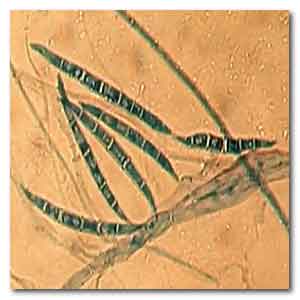|
Researchers at the French National Institute for
Agricultural Research (Inra) and their partners have
been studying the interactions between the bacterial
microbiota and a common food contaminant: the
mycotoxin deoxynivalenol (DON).
They found that the presence of DON enhances the
genotoxic effects of certain bacteria.

Fusarium gramineraum, a fungus that produces
deoxynivalenol © INRA, Sylviane BAILLY
More specifically, it increases the damage caused to
the DNA of intestinal cells, contributing to the
appearance of cancerous cells.
This work raises important questions regarding how
potential synergies between food contaminants and
the intestinal microbiota could contribute to
colorectal cancer development.
The human intestinal microbiota contains around
100,000 billion bacteria belonging to very diverse
species.
A common intestinal resident is Escherichia coli,
and E. coli strains form different phylogenetic
groups.
E. coli group B2 bacteria produce a genotoxic
substance, i.e. a product that damages the DNA of
intestinal cells, known as colibactin.
An increase has been noted in the number of group B2
bacteria in the gut microbiota of populations from
industrialised countries.
Mycotoxins are the most common natural contaminants
present in human and animal food.
One of these, deoxynivalenol (DON), is produced by
moulds from the Fusarium family, which mainly
develop in cereals.
The human populations in Europe and North America
are widely exposed to it in their food.
In France and Europe, exposure of some fractions of
the population, especially children, exceeds the
toxicity reference values for this toxin.
The Inra researchers and their partners conducted in
vitro and in vivo animal studies to see what
happened when colibactin-producing Escherichia coli
and DON were simultaneously present in the gut.
In animals colonised with colibactin-producing
bacteria and exposed to DON in their food, the DNA
damage to intestinal cells was significantly
greater, compared with animals not producing
colibactin.
They thus show that the presence of the mycotoxin
enhances the genotoxicity of group B2 E. coli.
These first results provide new data regarding
possible synergy between food contaminants and the
gut microbiota. The researchers will continue to
work to elucidate the mechanism involved in this
enhanced genotoxicity in the presence of DON, and
studies are planned to extend the observations up to
an advanced stage of colorectal carcinogenesis.
For more information
mBio - American Society for Microbiology
The Food Contaminant Deoxynivalenol Exacerbates the
Genotoxicity of Gut Microbiota
Link...
INRA - Institut national de la recherche agronomique
Link...
Inserm
Institut national de la santé et de la recherche
médicale
Link...
efsa
Mycotoxins
https://www.efsa.europa.eu/en/topics/topic/mycotoxins
Link...
MDN |